Talks and Presentations 2024
A user’s guide to the new biology. The Royal Institution. 12 February 2024, 2 pm. More details here.
A user’s guide to the new biology. The Royal Institution. 12 February 2024, 2 pm. More details here.
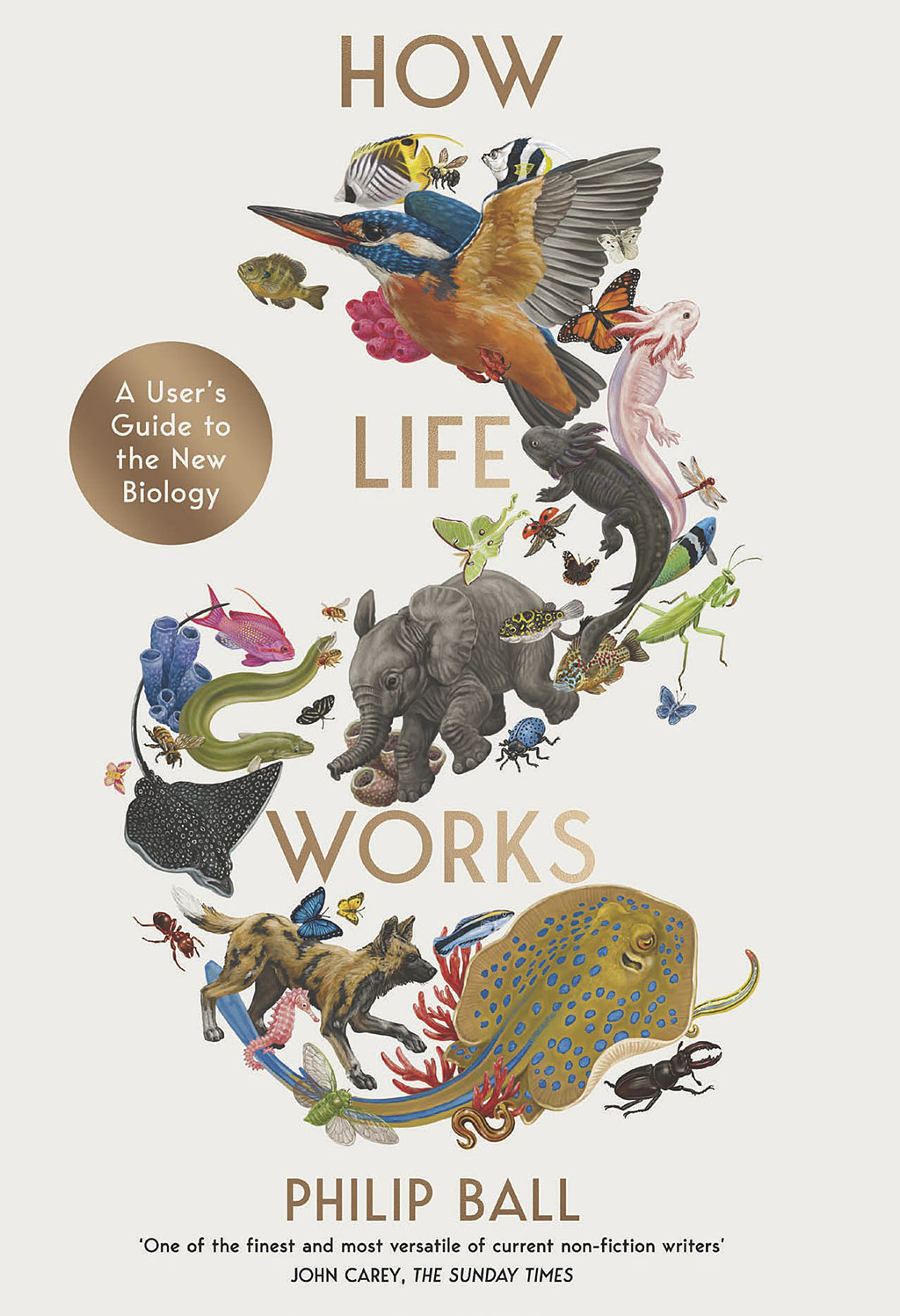 How Life Works: A User’s Guide to the New Biology by Philip Ball
How Life Works: A User’s Guide to the New Biology by Philip Ball“There is so much that is amazing. When Ball tackles issues, any textbook chalkiness gets blown away… For Ball, the possession of agency — and purpose, and even meaning — is precisely how you might characterise life. Life, then, is not the servant of the selfish gene. Life happens at other levels. In the cell. In the organism. In us.”
James McConnachie, Sunday Times
“Ball’s marvelous book is both wide-ranging and deep. It explores the fundamental mechanics of biology and leaves the reader full of awe and wonder. More than this, by reframing how we talk about the latest scientific discoveries, How Life Works has exciting implications for the future of the science of biology itself. I could not put it down.”
Siddhartha Mukherjee, author of the Pulitzer Prize–winning “The Emperor of All Maladies”
…
Reviews: HOW LIFE WORKS: A User’s Guide to the New BiologyRead More »
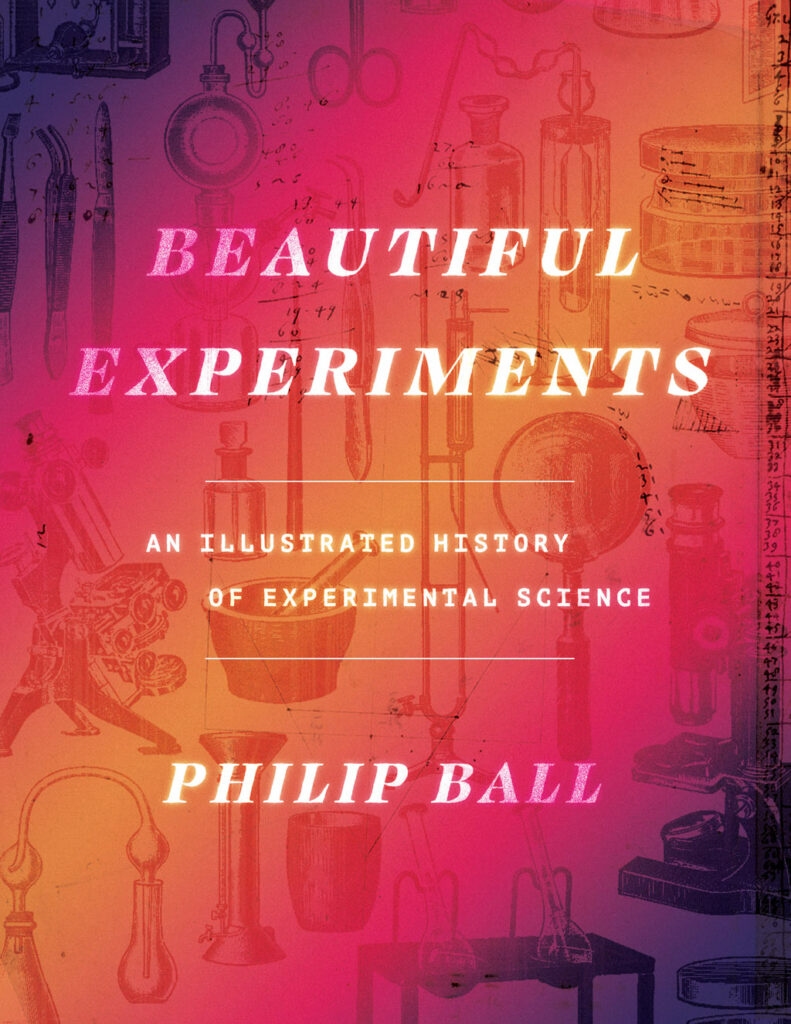 Beautiful Experiments: An Illustrated History of Experimental Science by Philip Ball
Beautiful Experiments: An Illustrated History of Experimental Science by Philip Ball“Although experimentation is arguably the backbone of modern science, historians of science have often tended to focus their studies on theoretical developments. . . . Ball aims to rectify that disparity in his new book Beautiful Experiments, which outlines sixty investigations carried out from antiquity to the present day. Ball groups the experiments into six chapters, each of which focuses on themes, including the behavior of organisms, the nature of light, and the nature of life. He complements those efforts with five meditative interludes that delve into philosophical or aesthetic topics relating to experimentation, such as how to define an experiment, why thought experiments are useful, and what scientists mean when they say an experiment is beautiful. The richly illustrated book is a treat for the eyes.”
Physics Today
…
Reviews: BEAUTIFUL EXPERIMENTS: An Illustrated History of Experimental ScienceRead More »
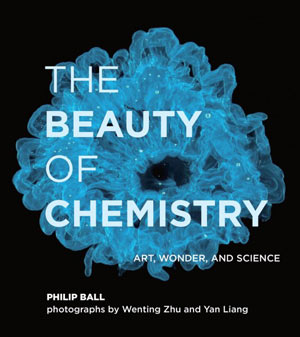 Philip Ball is a serendipitous writer, pursuing adventurous science. He loves to persuade and enchant his readers to celebrate the uncanny beauty of chemistry.” Dudley Herschbach, Nobel Laureate in Chemistry, Harvard University
Philip Ball is a serendipitous writer, pursuing adventurous science. He loves to persuade and enchant his readers to celebrate the uncanny beauty of chemistry.” Dudley Herschbach, Nobel Laureate in Chemistry, Harvard University
“This book combines rich descriptions of chemical phenomena with stunning photography of them as they happen. As a child, I was drawn to chemistry by the wonders of precipitating powders, fizzy water, and other ever-present phenomena. The Beauty of Chemistry took me back to those times.” Alán Aspuru-Guzik, Professor of Chemistry and Computer Science, University of Toronto
“Ousiophiles unite! This book is a sensory feast that truly brings to life the ‘chemical sublime,’ presenting it joyfully, with scintillating images. Using remarkably concise language, Ball pleasingly telescopes in scale from the visible to the subatomic level, giving a rich dimensional exploration of the elements and their properties. This book sparkles, bubbles, and bursts with the activity of all that surrounds us. It is curiosity-igniting, deeply satisfying, and a must for anyone who delights in ‘stuff’.”Martha Willette Lewis, Visual Artist in Residence, The Yale Quantum Institute
“Philip Ball offers a lively illustrated conversation centered on the beauty of chemistry rather than its oft-examined utility. His observations meander gracefully through bubbles, flames, plant pigments, and much more, and will both captivate a wide audience and provide a refreshingly upbeat boost for the most jaded professional.” Hagan Bayley, Professor of Chemical Biology, University of Oxford
Published by MIT Press, May 2021; Hardcover; over 350 colour illustrations ISBN 0-262-04441-2
Philip was awarded the Royal Society’s 2022 Wilkins-Bernal-Medawar Medal for excellence in a subject relating to the history of science, philosophy of science or the social function of science. The award citation mentions Philip’s “outstanding commitments to sharing the social, cultural, and historical context of science through prolific, and award-winning freelance science writing”.
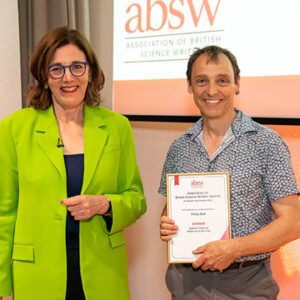
Philip’s article “Should scientists run the country” won the 2022 award from the Association of British Science Writers for the best Opinion piece.
Institute of Physics Kelvin Award 2019. Philip was awarded the William Thomson, Lord Kelvin Medal and Prize 2019 by the Institute of Physics, for communication of physics. More information here.
Philip was awarded the Physics World Book of the Year 2018 for his book Beyond Weird.
Philip was Science Commentator of the Year 2017 in the Editorial Intelligence Comment Awards.
Philip was a judge of the Baillie Gifford Prize for Non-Fiction, 2016. Details here.
Philip was chosen as Science Commentator of the Year in the 2015 Comment Awards.
Philip was Science Commentator of the Year 2015 in the Editorial Intelligence Comment Awards.
Philip is a member of the core group of the Created Out of Mind residency project at the Wellcome Hub.
Serving the Reich was shortlisted for the Royal Society Winton Science Book Prize, 2014: see here.
Philip was shortlisted for the Comment Awards Science Commentator of the Year, 2014.
The Music Instinct was longlisted for the Samuel Johnson Prize for nonfiction, 2010: see here.
The Music Instinct was shortlisted for the Royal Philharmonic awards, 2011.
Philip was made a Fellow of the Royal Society of Chemistry in 2011.
Philip was awarded an honorary degree (Doctor of Letters) from the University of Bristol in 2009.
The 2008 (inaugural) Lagrange Prize of the ISI and CRT Foundations (Italy) “for work aimed at dissemination and popularization of the concepts and notions of complexity science.”
Dingle Prize, 2007 (British Society for the History of Science) for “the best recent book that communicates the history of science, technology and or medicine to a wide audience of non-specialists”: awarded for Elegant Solutions: Ten Beautiful Experiments in Chemistry (RSC, 2006). See https://www.bshs.org.uk/
Critical Mass was awarded the Aventis Prize for Science Books, 2005
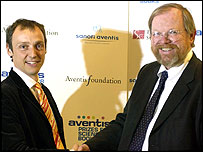
Click for more details from BBC.
Click to see the awards ceremony at the Royal Society
Click for more details from Nature
Click for more details from New Scientist
American Chemical Society James T. Grady-James H. Stack Award for Interpreting Chemistry for the Public, 2006
Philip was given the debatable honour of being designated ‘Guru of the Week’ by the Financial Times on 14 February 2004.
The Society for the History of Technology awarded Bright Earth the Sally Hacker Prize for best writing on the history of technology, 2003.
Philip was awarded an honorary Degree (Doctor of Science) from Union College, Schenectady, NY, awarded in February 2003.
Bright Earth was shortlisted for the US National Book Critics Circle award in the category ‘Criticism’, 2002.
Association of British Science Writers award 2001, for the best communication of science in a non-science context. Awarded for More Than Meets the Eye, booklet to accompany the exhibition of the same name at the V&A Museum, London, September-November 2001.
Premio Acqua Scrittura 2000: awarded in Salsomaggiore, Italy, for the best international writing on water. Awarded for H2O: A Biography of Water.
Association of American Publishers Award for the best new book in chemistry 1994, awarded for Designing the Molecular World.
Philip is on the editorial boards of Interdisciplinary Science Reviews and ComPlexUs. He is a member of the European Commision Expert Group on Synthetic Biology, the Advisory Council for the Institute of Advanced Study of Durham University, and the European editorial board of Princeton University Press.
Paracelsus and the World of Renaissance Science and Magic. Royal Society of Chemistry History Group, online. 24 January, 2 pm. Details here.
Why Water Is Weird. 800th anniversary celebrations of the University of Padua, Italy. 6 February.
How To Build a Replicant (chairing). Science Museum, London. 12 March.
Can Science Be Neutral? Panel, Jermyn Theatre, Jermyn St., London, 7 pm. 22 March.
The Space of Possible Minds. Highgate Literary and Scientific Institution, Highgate, London. 23 March.
The War of the Worlds. Pre-screening talk for Spielberg’s film, Barbican Cinema, London. 9 May, 6.10 pm. Details here.
Remaking Ourselves. Wilkins-Bernal-Medawar Medal Lecture, The Royal Society, London, 11 May, 6.30 pm. Details here.

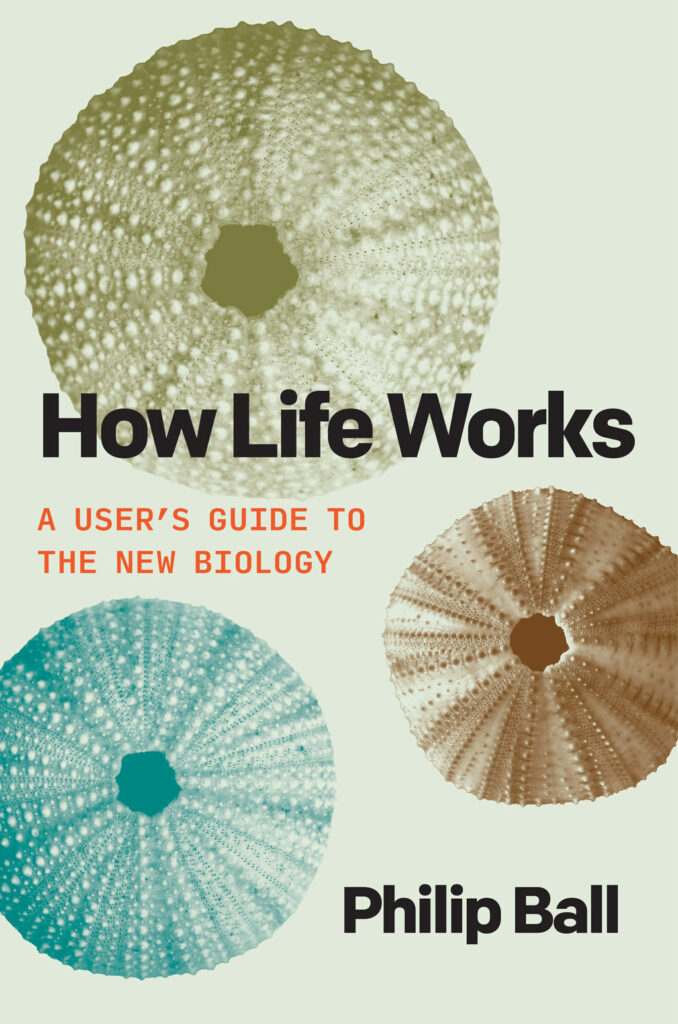
Biology is undergoing a quiet but profound transformation. Several aspects of the standard picture of how life works—the idea of the genome as a blueprint, of genes as instructions for building an organism, of proteins as precisely tailored molecular machines, of cells as entities with fixed identities, and more—have been exposed as incomplete, misleading, or wrong.
…
HOW LIFE WORKS: A User’s Guide to the New BiologyRead More »
Led by the Science by Philip Ball.
Radio 4 Broadcast 2021

Ahead of a huge year for climate change policy that will culminate in COP 26 in Glasgow, Philip Ball explores how the fight against climate change can move beyond the political left/right agenda. The left has been labelled as the part of the political spectrum for policies that will reduce carbon emissions and the right as those arguing for business as usual. But Philip Ball shows that the picture is more complex than that.
…
Led by the Science by Philip Ball.
Radio 4 Broadcast 2020

Throughout the Covid-19 pandemic the UK government has stated that its decisions have been “led by the science”. This pithy phrase implies there is a fixed body of knowledge from a consensus of scientists that provides a road map of what to do to stop the pandemic. But there isn’t. …
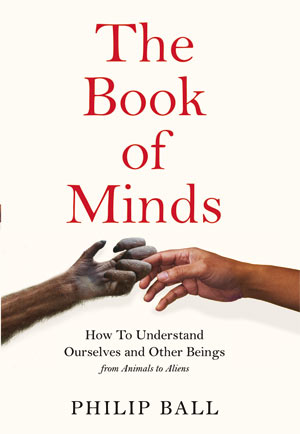 “Ball argues that we must look beyond our own brains and delve into the minds of other creatures if we want to truly understand ourselves and comprehend the possibility of alien or machine intelligence.” New Scientist, “Don’t Miss”
“Ball argues that we must look beyond our own brains and delve into the minds of other creatures if we want to truly understand ourselves and comprehend the possibility of alien or machine intelligence.” New Scientist, “Don’t Miss”
“That even plants might have a degree of consciousness is one aspect of mind considered in Philip Ball’s wide-ranging new book… Peering into other putative minds—animal, plant, AI, alien—Ball breaks the narcissistic trap of our sapiocentrism, our default assumption that the world is ours first, and only later should we condescend to find a little space for the rest of creation… Ball deals equally coolly with the possibility of communicating with other minds in the cosmos—having recently learnt to message the universe after billions of years, why would we expect another life form suddenly to respond? Ball is the laureate of curiosity and a one-stop source of wisdom. This book will teach you a lot about minds; but it will also make you marvel at the capacious and sagacious one possessed by its author.” Prospect …